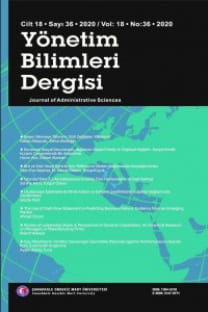İŞLETME EĞİTİMİNDE SİMÜLASYON PROGRAMLARININ BİTİRME PROJESİ OLARAK KULLANIMI: VAKA ANALİZİ
USING SIMULATION PROGRAMS AS CAPSTONE PROJECT IN BUSINESS ADMINISTRATION EDUCATION: A CASE STUDY
___
- Carr, D. (2003). Philosophy and the meaning of education. Theory and Research in Education, V. 1(2), 195- 2 12.
- Cosenz, F., Notob, G. (2018). Fostering entrepreneurial learning processes through Dynamic Start-up business model simulators. The International Journal of Management Education 16, 468–482. https://doi.org/10.1016/j.ijme.2018.08.003
- Bell, R., Loon, M. (2015). The impact of critical thinking disposition on learning using business simulations. The International Journal of Management Education. 13, 119- 127. http://dx.doi.org/10.1016/j.ijme.2015.10.003
- Blackford, B., Shi, T. (2015.The relationship between business simulations in capstone management courses and standardized test scores. The International Journal of Management Education. 13, 84-94
- Borrajo, F., Bueno, Y., Pablo, I., Santos, B., Fernández, F., García, J., and Sagredo, I., (2010). SIMBA: A simulator for business education and research. Decision Support Systems. 48, 498–506.
- Burdon, W. M., Munro, K. (2017). Simulation is it all worth it? The impact of simulation from the perspective of accounting students The International Journal of Management Education 15, 429-448. doi.org/10.1016/j.ijme.2017.07.001
- Dereköy, F. and Ayhün, S.E (2017). Simulation implementation in development of business and accounting education-virtual enterprise: A case study. International Journal of Economics and Administrative Studies (16. UİK Özel Sayısı):781-792 ISSN 1307-9832.
- Gatti, L., Ulrich, M., and Seele, P. (2018). Education for sustainable development through business simulation games: An exploratory study of sustainability gamification and its effects on students’ learning outcomes. Journal of Cleaner Production 207, 667- 678. https://doi.org/10.1016/j.jclepro.2018.09.130
- Gredler, M. E.(2004). Games and simulations and their relationships to learning. In D.H. Jonassen (Ed.), Handbook of research on educational communications and technology (2nd ed.). (pp. 571-581). Mahwah, NJ: Lawrence Erlbaum Associates.
- Hernandez-Lara, Perera-Lluna and Serradell-Lopez (2018). Applying learning analytics to students’ interaction in business simulation games. The usefulness of learning analytics to know what students really learn. Computers in Human Behavior. (pp. 1-13) https://doi.org/10.1016/ j.chb.2018.03.001
- Hughes, S., Scholtz, F.(2015). Increasing the impact of a business simulation: The role of reflection. The International Journal of Management Education 13, 350-361. http:// dx.doi.org/10.1016/j.ijme.2015.06.001
- Jahangiriana, M., Eldabib, T., Naseera, A., Stergioulasa, L. K., and Young, T. (2010). Simulation in manufacturing and business: A review. European Journal of Operational Research (1-13). doi:10.1016/j.ejor.2009.06.004.
- Jones, K. (1998). Simulations as examinations. Simulation & Gaming, 29(3), 331e341. http://dx.doi.org/10.1177/1046878198293010.
- Lin, H., H., Yen, W., C., and Wang, Y., S. (2018). Investigating the effect of learning method and motivation on learning performance in a business simulation system context: An experimental study. Computers & Education, 127, 30–40.
- Mahboubian, M. (2010). Educational aspects of business simulation softwares. Social and Behavioral Sciences. 2, 5403-5407. doi:10.1016/j.sbspro.2010.03.881.
- Marketplace SIMULATIONS. https://www.marketplace-simulation.com/capstone- simulations
- Nisula, K., and Pekkola, S. (2012). ERP-based simulation as a learning environment for SME business. The International Journal of Management Education. 10, 39–49
- Pando-Garcia, J., Periañez-Cañadillas, I., and Charterina, J. (2016). Business simulation games with and without supervision: An analysis based on the TAM model. Journal of Business Research (1731–1736). http://dx.doi.org/10.1016/j.jbusres.2015.10.046
- Pasin, F., Giroux, F. (2011). The impact of a simulation game on operations management education. Computers & Education, 57, 1240–1254
- Polyakova, E., I. (2016). Business simulation as a means of developing intercultural competence. Social and Behavioral Sciences. 236, 289 – 294. International Conference on Communication in Multicultural Society.
- Rosen, K. R. (2008). The history of medical simulation. Journal of Critical Care, 23(2), 157- 166. http://dx.doi.org/10.1016/j.jcrc.2007.12.004.
- Pratt, M., A., Hahn, S. (2016). Enhancing hospitality student learning through the use of a business simulation. Journal of Hospitality, Leisure, Sport & Tourism Education. 19. 10–18. http://dx.doi.org/10.1016/j.jhlste.2016.05.001.
- Rusu, L., C. (2012). Action and reaction-case study from a business simulation. Economics and Finance. 3, 1243-1249. doi: 10.1016/S2212-5671(12)00303-6
- Vos, L. (2015). Simulation games in business and marketing education: How educators assess student learning from simulations. The International Journal of Management Education, 13, 57- 74. http://dx.doi.org/10.1016/j.ijme.2015.01.001.
- Yağcı, M. İ and Özkan, C. (2014). International marketing courses in Turkish business administration programs. Doğuş Üniversitesi Dergisi, 15, (1) 31-43
- Zhang, M., J., (2015). Using login data to monitor student involvement in a business simulation game. The International Journal of Management Education 13, 154-162. http://dx.doi.org/10.1016/j.ijme.2015.02.003
- ISSN: 1304-5318
- Yayın Aralığı: 4
- Başlangıç: 2003
- Yayıncı: Yönetim Bilimleri Dergisi
ÖRGÜTSEL İTİBAR MEKANİZMASININ KARAR ALMA SÜREÇLERİNE ENTEGRASYONU: FACEBOOK ÖRNEĞİ
Paternalist Liderliğin Örgütsel Bağlılığa Etkisi: Gemiadamları Üzerinde Bir Araştırma
Ayşehan ÇAKICI, Abdurahman BURAK
SÜREKLİ DALGACIK DÖNÜŞÜMLÜ GRANGER NEDENSELLİK ANALİZİ: TÜRKİYE ÖRNEĞİ
Sürekli Dalgacık Dönüşümlü Granger Nedensellik Analizi: Türkiye Örneği
PATERNALİST LİDERLİĞİN ÖRGÜTSEL BAĞLILIĞA ETKİSİ: GEMİADAMLARI ÜZERİNDE BİR ARAŞTIRMA
Ayşehan ÇAKICI, Abdurrahman BURAK
Using Simulation Programs in Business Administration Education: An Example in Turkey
TİCARİ AÇIKLIK ÜZERİNDE TARİFLERİN KARMAŞIKLIK DÜZEYİNİN ETKİLERİNİN BİR ANALİZ
Mustafa TORUN, Hakan ÇETİNOĞLU
An Analysıs of The Effects of Complexıty Level of The Tarıffs on Trade Opennes
